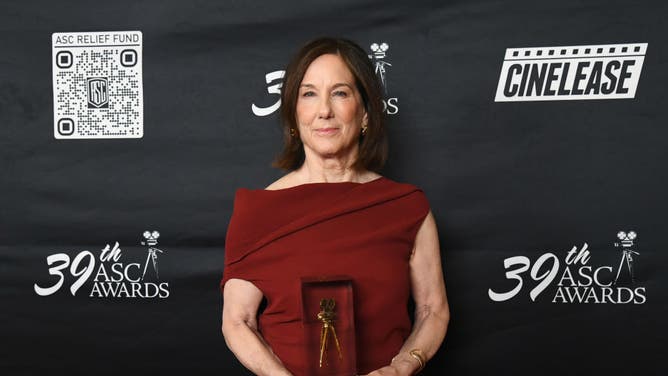Kathleen Kennedy Leaving Lucasfilm, Ending Disastrous 'Star Wars' Tenure
It's finally over. With Kathleen Kennedy reportedly set to leave Lucasfilm by the end of 2025, the least successful tenure from a film executive in the history of the entertainment industry is coming to an end. Although it's far, far too late to save Disney and Lucasfilm from the damage she caused over her decade in charge.
Kennedy, you might remember, was the target of the now-infamous "South Park" episode called "South Park: Joining the Panderverse."
That episode focused on Kennedy's one creative addition to each and every project she touched: "Put a chick in it, and make her lame and gay."
You'd think that would be a comedic exaggeration, but it was either literally what Lucasfilm projects turned into under Kennedy, or shockingly close. And it cost her company, and its parent organization, incalculable amounts of money and brand reputation.

Kathleen Kennedy at the 39th Annual American Society of Cinematographers Awards held at The Beverly Hilton on February 23, 2025 in Los Angeles, California. (Photo by Alberto Rodriguez/Variety via Getty Images)
Kathleen Kennedy's Exit Too Late To Save Lucasfilm
The list of failures under Kennedy is nearly endless. But mentioning just a few "highlights" illustrates exactly why it was necessary for her to leave.
Kennedy was responsible for the latest "Star Wars" trilogy, a discombobulated mess with no coherent plan. Somehow, Disney and Lucasfilm had no vision for how the trilogy would go, ensuring that the three films would feel disjointed and disconnected. An inexcusable failure for one of the industry's most valuable properties.
"The Force Awakens" was a near copy "A New Hope." This time with a female character replacing Luke Skywalker. Though at least it stayed generally true to the work of the original.
"The Last Jedi" then brought out another Kennedy hallmark; turning legendary male characters, this time Luke Skywalker, into disgruntled, angry, bitter failures. Unsurprisingly, it was not well received.
Kennedy and Lucasfilm panicked, turning back to J.J. Abrams, who churned out a rushed, nonsensical conclusion: "The Rise of Skywalker." A critical and box office failure that earned $420 million less at the domestic box office than "The Force Awakens." That's not a misprint; it made $420 million less than the first film in the new trilogy. That's how poorly executed Kennedy's "Star Wars" project turned out to be.
And it wasn't just the big screen.
While "The Mandalorian" was a temporary success, most other Lucasfilm projects came and went. At best. Disney+ series like "Obi-Wan," "The Book of Boba Fett" "The Bad Batch," "Ahsoka," and "Skeleton Crew" failed to generate much cultural impact. While "Andor" was well received, "The Acolyte" put a capstone on Kennedy's lack of creative talent.
It was a disastrous, unpopular progressive lecture, the literal embodiment of the "South Park" episode, canceled by Disney after just one season.
READ: 'Star Wars' Series Actor And Creator Brag New Show Is Super Gay
The last major "Star Wars" film came out nearly six years ago, and there's no new project on the immediate horizon. That's how bad things are going for Lucasfilm's most important property right now. Even if there were, trust in the studio to release a competent, well-made and well-received "Star Wars" film is almost completely gone. Because Kennedy's instincts, hiring, and obvious casting mandates were just that bad.
Then there's "Indiana Jones."
In the latest "Jones" film, "Dial of Destiny," Kennedy tried to replace one of film's most popular characters and actors with Phoebe Waller-Bridge. Also not a misprint. A virtually unknown British actress who might weigh 120 pounds soaking wet was cast in the film as a not-so-subtle nod to the future of the franchise. No more Harrison Ford or other believably physical actor to fulfill the swashbuckling hero archetype Indiana Jones was quite literally based on. Instead, Kennedy decided that fans would get Phoebe Waller-Bridge in "Indiana Jones" and Daisy Ridley in "Star Wars," and they'd like it. They didn't.
"Dial of Destiny" also turned Ford's Jones into a depressed, decrepit old man, going from being chased out of his classroom by adoring students in the original films, to living in a tiny, ugly, crappy New York City apartment and lecturing in a nearly-empty hall of sleeping kids.
Unsurprisingly, it was a critical and commercial flop. With Waller-Bridge providing little-to-nothing of value, and almost immediately ending any future plans for a franchise with her at the center.
This is Kennedy's legacy: an entire tenure exemplified by an ideology that appears, hopefully, to be dead. The ridiculous belief that the only necessary ingredient for a successful movie is checking the correct boxes on the casting sheet. That "the force is female," as her famous t-shirt photo said, pleasing nobody and alienating many. That male characters were there to be mocked, belittled, humiliated, and demonized by their superior female peers.
Disney lost billions by letting Kennedy take charge of one of their most important live-action intellectual property assets. But perhaps even worse, they let her destroy some of the most important brands in film history. Permanently damaging the reputation and quality of the work they paid to purchase. Good riddance.